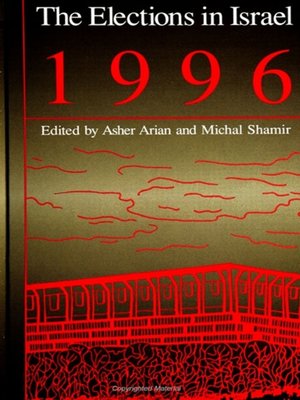
Sign up to save your library
With an OverDrive account, you can save your favorite libraries for at-a-glance information about availability. Find out more about OverDrive accounts.
Find this title in Libby, the library reading app by OverDrive.



Search for a digital library with this title
Title found at these libraries:
| Loading... |
Leading social scientists from Israeli and American universities, using different methods and representing diverse intellectual traditions, address the precedent-setting events of Israel's 1996 elections. The contributors discuss the meaning of collective identity, the role of religion and nationalism in modern Israel, the political behavior of Israeli Arabs, the secrets of success of the immigrant party. Also discussed are issues such as the impact of the direct election law on party organization, primaries and coalition-formation calculations, the repeated electoral failure of Shimon Peres, and the role of the media in the election campaign.
The 1996 elections in Israel represented a "first" in Israeli politics in many ways. For the first time Israelis directly elected their prime minister and, in simultaneous but separate elections, they elected their 120-member Knesset (parliament). Also, it was the first time that elections were held after the mutual recognition of Israel and the Palestine Liberation Organization following the Oslo accords and it was the first election held after the assassination of Prime Minister Yitzhak Rubin.
The political parties made widespread use of primaries in 1996, and hundreds of thousands of new immigrants from the former Soviet Union cast their first ballots. The large support for a party supported by former-Soviet immigrants highlighted the emergence of sectarian interests. This was also expressed in the surge for the two Arab parties from five seats in 1992 to nine seats in 1996, and for the three Jewish religious parties whose combined representation grew from 16 to 23 seats.
The 1996 elections in Israel represented a "first" in Israeli politics in many ways. For the first time Israelis directly elected their prime minister and, in simultaneous but separate elections, they elected their 120-member Knesset (parliament). Also, it was the first time that elections were held after the mutual recognition of Israel and the Palestine Liberation Organization following the Oslo accords and it was the first election held after the assassination of Prime Minister Yitzhak Rubin.
The political parties made widespread use of primaries in 1996, and hundreds of thousands of new immigrants from the former Soviet Union cast their first ballots. The large support for a party supported by former-Soviet immigrants highlighted the emergence of sectarian interests. This was also expressed in the surge for the two Arab parties from five seats in 1992 to nine seats in 1996, and for the three Jewish religious parties whose combined representation grew from 16 to 23 seats.






